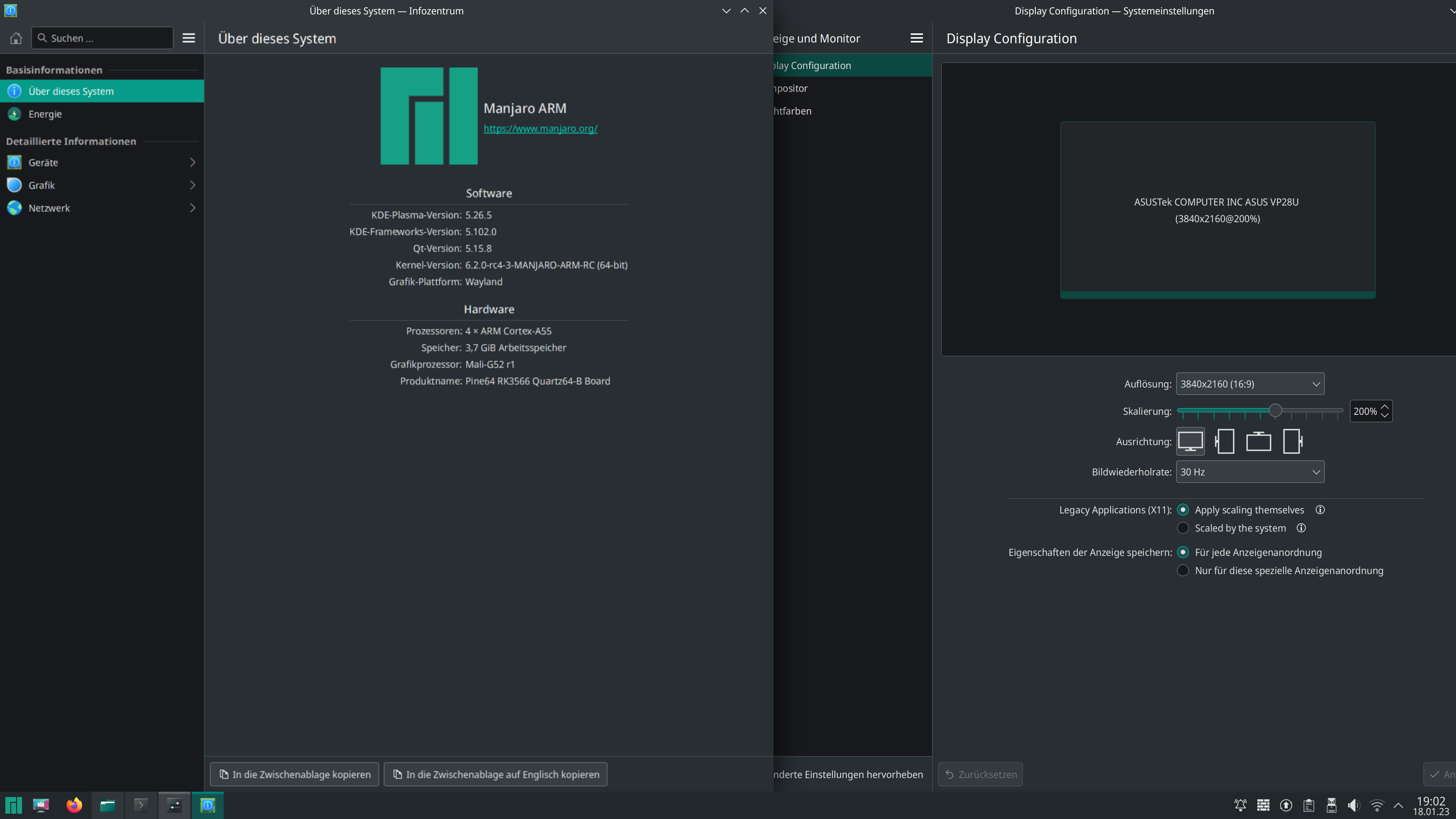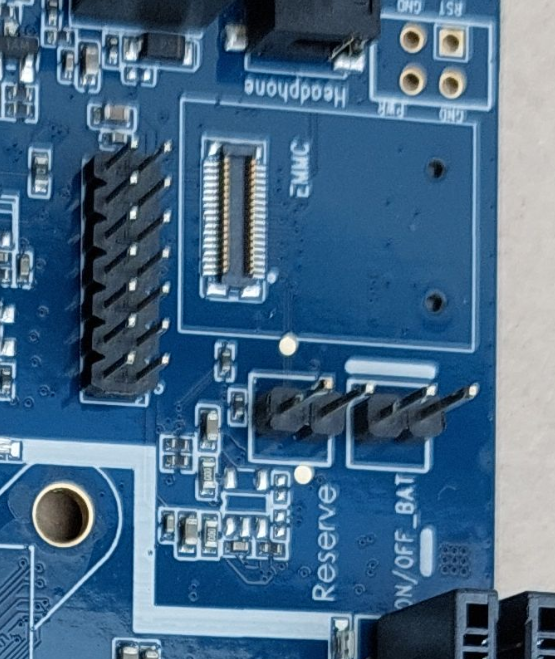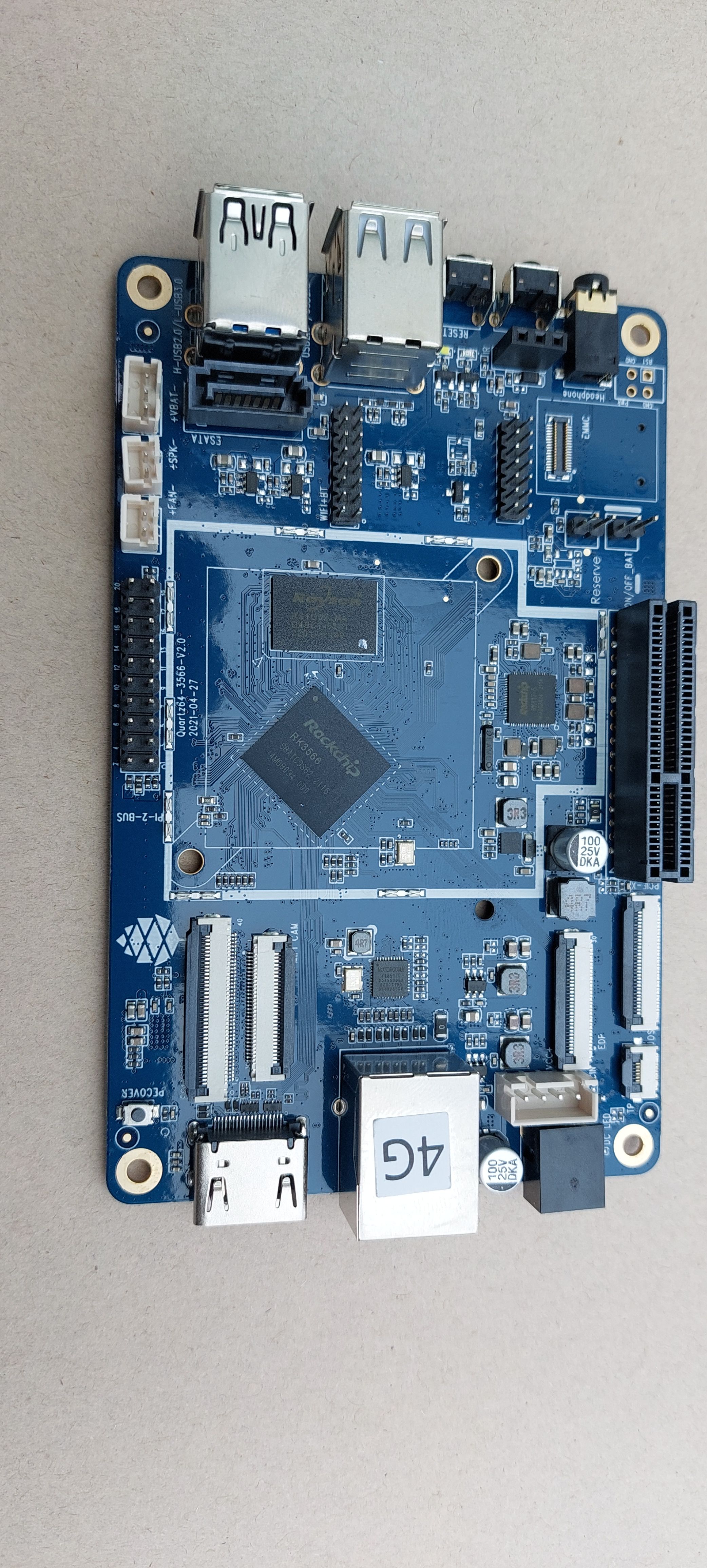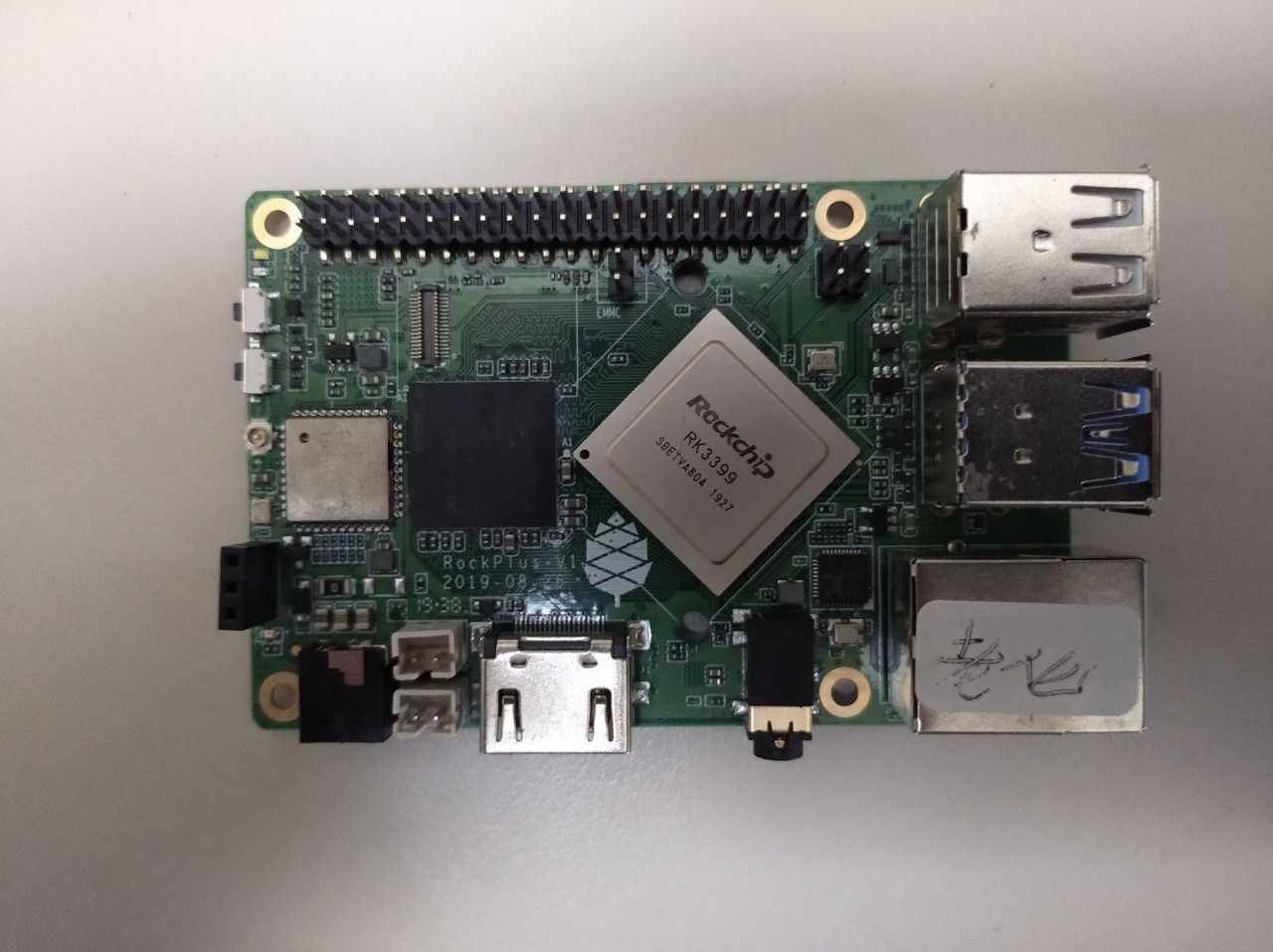Quartz64 - Manjaro Image Aktuell!
-
So, heute mal wieder ein wenig gespielt. Es gab ein paar Updates und auch einen neuen Uboot
Was sehen wir?
[root@quartz64 ~]# lsblk NAME MAJ:MIN RM SIZE RO TYPE MOUNTPOINTS sda 8:0 0 931,5G 0 disk └─sda1 8:1 0 931,5G 0 part mmcblk0 179:0 0 29,7G 0 disk ├─mmcblk0p1 179:1 0 7M 0 part ├─mmcblk0p2 179:2 0 213,6M 0 part /boot └─mmcblk0p3 179:3 0 29,5G 0 part / zram0 254:0 0 5,7G 0 disk [SWAP] nvme0n1 259:0 0 465,8G 0 disk ├─nvme0n1p1 259:1 0 7M 0 part ├─nvme0n1p2 259:2 0 213,6M 0 part └─nvme0n1p3 259:3 0 1,3G 0 partDie SATA Buchse funktioniert.
Mit einer 2,5 Zoll HDD
[root@quartz64 tmp]# dd if=/dev/zero of=sd.img bs=1M count=4096 conv=fdatasync 4096+0 Datensätze ein 4096+0 Datensätze aus 4294967296 Bytes (4,3 GB, 4,0 GiB) kopiert, 48,0536 s, 89,4 MB/s -
Heute das neue DEV Image ausprobiert. Dev 20210726
Da steht ja was von WiFi, also mal ausprobieren, geht natürlich nicht...... Mit Dan, dem ARM Betreuer von Manjaro gechattet, kommt das
That is not what the firmware file is called for the ap6256 thats suppose to be the module for Quartz64.
Es stellte sich raus, das die die Software für das Modul hinzufügen, von dem WiFi-Modul was im Quartz64 B verbaut sein wird, das selbe wie im PineBookPro. Ok, ich schrieb zurück, ich habe das Modell vom RockPro64....
So you can try installing ap6398s-firmware and see if that helps.
Ich dann dumm gefragt, wo ich das herbekomme...
sudo pacman -S ap6398s-firmware
Ok, dann schrieb er noch das ein File kopiert werden musste.
cp /usr/lib/firmware/brcm/brcmfmac4359-sdio.ugoos,am6.txt to /usr/lib/firmware/brcm/brcmfmac4359-sdio.pine64,quartz64.txt
Ok, da stimmt aber eine Kleinigkeit nicht.
Direct firmware load for brcm/brcmfmac4359-sdio.pine64,quartz64-a.txt failed with error -2Somit habe ich den cp Befehl angepasst.
usr/lib/firmware/brcm/brcmfmac4359-sdio.ugoos,am6.txt to /usr/lib/firmware/brcm/brcmfmac4359-sdio.pine64,quartz64-a.txtUnd bingo, danach hatte ich WiFi. Wie? Da sind wir dann wieder bei meinem Lieblingsthema......
 Ich fasse die Schritte in einem anderen Beitrag aber noch mal extra zusammen, auch für mich....
Ich fasse die Schritte in einem anderen Beitrag aber noch mal extra zusammen, auch für mich.... -
cpufreq geht seit heute
Kernel
[root@quartz64 mnt]# uname -a Linux quartz64 5.14.0-rc1-0.4-MANJARO-ARM #1 SMP PREEMPT Thu Aug 5 16:34:23 UTC 2021 aarch64 GNU/Linuxsbc-bench
########################################################################## Checking cpufreq OPP: Cpufreq OPP: 1800 Measured: 1824.508/1824.611/1821.790 Cpufreq OPP: 1608 Measured: 1673.585/1673.950/1674.540 Cpufreq OPP: 1416 Measured: 1426.804/1426.898/1426.520 Cpufreq OPP: 1104 Measured: 1315.974/1316.027/1315.692 Cpufreq OPP: 816 Measured: 815.176/815.346/815.075 Cpufreq OPP: 600 Measured: 598.188/599.205/599.211 Cpufreq OPP: 408 Measured: 406.304/333.432/406.870sbc-bench Ergebnisse -> https://pastebin.com/CqLWZ69t
-
Mit dem Kernel
[root@quartz64 ~]# uname -a Linux quartz64 5.14.0-rc1-0.6-MANJARO-ARM #1 SMP PREEMPT Mon Aug 9 18:54:49 UTC 2021 aarch64 GNU/Linuxgeht jetzt der Sound über die Buchse für Micro/Kopfhörer.
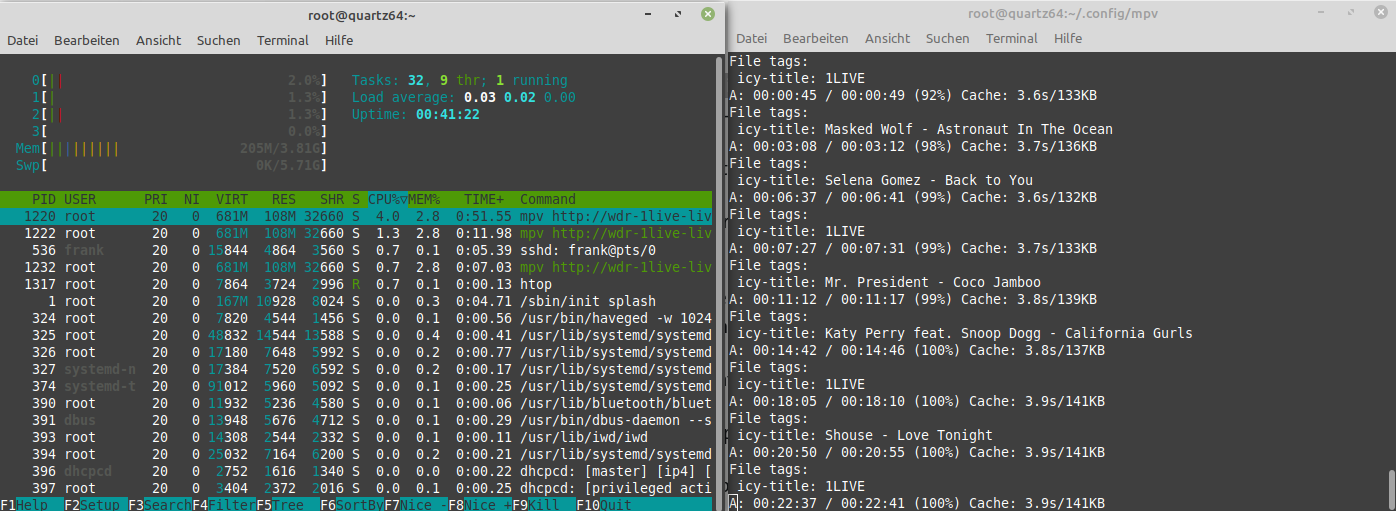
Ich habe zum Ausprobieren das Tool mpv genutzt. Mit den anderen Sachen, wie alsa usw. bin ich auf der Manjaro Distribution nicht klar gekommen.
-
Bitte versucht nicht den PCIe Slot mit einer NVMe SSD zu nutzen. Zum einen crasht der Treiber aktuell, aber das größere Problem meiner Meinung nach. Die SSD wird extrem warm / heiß im Vergleich zu meinem ROCKPro64.
Die Entwickler waren der Meinung, das das so in Ordnung ist. Ich bleibe bei meiner Einschätzung, das da was nicht stimmt. Ob das nochmal was wird mit diesem Board? Oder soll ich das verkaufen? Hmm....
[ 124.766803] EXT4-fs (nvme0n1p1): mounted filesystem with ordered data mode. Opts: (null). Quota mode: none. [ 197.598326] nvme nvme0: controller is down; will reset: CSTS=0x3, PCI_STATUS=0x2010 [ 197.735316] nvme nvme0: Shutdown timeout set to 8 seconds [ 197.743042] nvme nvme0: 4/0/0 default/read/poll queues [ 228.317516] nvme nvme0: I/O 0 QID 2 timeout, disable controller [ 228.398160] blk_update_request: I/O error, dev nvme0n1, sector 2074112 op 0x1:(WRITE) flags 0x4000 phys_seg 1 prio class 0 [ 228.399167] blk_update_request: I/O error, dev nvme0n1, sector 2071552 op 0x1:(WRITE) flags 0x4000 phys_seg 1 prio class 0 [ 228.400142] EXT4-fs warning (device nvme0n1p1): ext4_end_bio:342: I/O error 10 writing to inode 12 starting block 260352) [ 228.400162] blk_update_request: I/O error, dev nvme0n1, sector 2196480 op 0x1:(WRITE) flags 0x0 phys_seg 1 prio class 0 [ 228.401111] blk_update_request: I/O error, dev nvme0n1, sector 2193920 op 0x1:(WRITE) flags 0x4000 phys_seg 1 prio class 0 [ 228.402083] blk_update_request: I/O error, dev nvme0n1, sector 2191360 op 0x1:(WRITE) flags 0x4000 phys_seg 1 prio class 0 [ 228.403057] blk_update_request: I/O error, dev nvme0n1, sector 2188800 op 0x1:(WRITE) flags 0x4000 phys_seg 1 prio class 0 [ 228.404029] blk_update_request: I/O error, dev nvme0n1, sector 2186240 op 0x1:(WRITE) flags 0x4000 phys_seg 1 prio class 0 [ 228.405002] blk_update_request: I/O error, dev nvme0n1, sector 2183680 op 0x1:(WRITE) flags 0x4000 phys_seg 1 prio class 0 [ 228.405974] blk_update_request: I/O error, dev nvme0n1, sector 2181120 op 0x1:(WRITE) flags 0x4000 phys_seg 1 prio class 0 [ 228.406946] EXT4-fs warning (device nvme0n1p1): ext4_end_bio:342: I/O error 10 writing to inode 12 starting block 274688) [ 228.406954] blk_update_request: I/O error, dev nvme0n1, sector 2180096 op 0x1:(WRITE) flags 0x0 phys_seg 1 prio class 0 [ 228.407544] Buffer I/O error on device nvme0n1p1, logical block 258048 [ 228.407939] EXT4-fs warning (device nvme0n1p1): ext4_end_bio:342: I/O error 10 writing to inode 12 starting block 272640) [ 228.408492] Buffer I/O error on device nvme0n1p1, logical block 258049 [ 228.408502] EXT4-fs warning (device nvme0n1p1): ext4_end_bio:342: I/O error 10 writing to inode 12 starting block 270592) [ 228.409072] Buffer I/O error on device nvme0n1p1, logical block 258050 [ 228.409085] EXT4-fs warning (device nvme0n1p1): ext4_end_bio:342: I/O error 10 writing to inode 12 starting block 268544) [ 228.409650] Buffer I/O error on device nvme0n1p1, logical block 258051 [ 228.409660] EXT4-fs warning (device nvme0n1p1): ext4_end_bio:342: I/O error 10 writing to inode 12 starting block 266496) [ 228.410228] Buffer I/O error on device nvme0n1p1, logical block 258052 [ 228.410394] nvme nvme0: failed to mark controller live state [ 228.410553] Buffer I/O error on dev nvme0n1p1, logical block 62423041, lost sync page write [ 228.410593] Aborting journal on device nvme0n1p1-8. [ 228.410622] Buffer I/O error on dev nvme0n1p1, logical block 62423040, lost sync page write [ 228.410637] JBD2: Error -5 detected when updating journal superblock for nvme0n1p1-8. [ 228.410807] Buffer I/O error on device nvme0n1p1, logical block 258053 [ 228.411208] EXT4-fs error (device nvme0n1p1): ext4_check_bdev_write_error:215: comm kworker/u8:5: Error while async write back metadata [ 228.411237] EXT4-fs (nvme0n1p1): Delayed block allocation failed for inode 12 at logical offset 329728 with max blocks 2048 with error 30 [ 228.411244] EXT4-fs (nvme0n1p1): This should not happen!! Data will be lost [ 228.411256] EXT4-fs error (device nvme0n1p1) in ext4_writepages:2819: Journal has aborted [ 228.411548] nvme nvme0: Removing after probe failure status: -19 [ 228.411976] Buffer I/O error on device nvme0n1p1, logical block 258054 [ 228.415142] EXT4-fs error (device nvme0n1p1): ext4_journal_check_start:83: comm kworker/u8:5: Detected aborted journal [ 228.416108] Buffer I/O error on device nvme0n1p1, logical block 258055 [ 228.419692] Buffer I/O error on device nvme0n1p1, logical block 258056 [ 228.420322] Buffer I/O error on device nvme0n1p1, logical block 258057 [ 228.424234] EXT4-fs error (device nvme0n1p1): ext4_journal_check_start:83: comm kworker/u8:6: Detected aborted journal [ 228.427515] EXT4-fs error (device nvme0n1p1): ext4_journal_check_start:83: comm dd: Detected aborted journal [ 228.477516] nvme0n1: detected capacity change from 1000215216 to 0 [ 228.477570] Buffer I/O error on dev nvme0n1p1, logical block 0, lost sync page write [ 228.478291] EXT4-fs warning (device nvme0n1p1): ext4_end_bio:342: I/O error 10 writing to inode 12 starting block 372992) [ 228.478331] EXT4-fs (nvme0n1p1): previous I/O error to superblock detected [ 228.478350] EXT4-fs (nvme0n1p1): previous I/O error to superblock detected [ 228.478360] EXT4-fs (nvme0n1p1): previous I/O error to superblock detected [ 228.478374] Buffer I/O error on dev nvme0n1p1, logical block 0, lost sync page write [ 228.478380] EXT4-fs (nvme0n1p1): I/O error while writing superblock [ 228.478384] EXT4-fs (nvme0n1p1): Remounting filesystem read-only [ 228.478952] Buffer I/O error on dev nvme0n1p1, logical block 0, lost sync page write [ 228.478959] EXT4-fs (nvme0n1p1): I/O error while writing superblock [ 228.478993] EXT4-fs (nvme0n1p1): I/O error while writing superblock [ 228.479001] EXT4-fs (nvme0n1p1): ext4_writepages: jbd2_start: 1024 pages, ino 12; err -30 [ 228.479587] Buffer I/O error on dev nvme0n1p1, logical block 0, lost sync page write -
Das oben geschilderte Problem ist weg. Was habe ich gemacht? Ich habe das Image meistens nur mit
pacman -Syuaktualisiert. Heute bin ich mal auf die Idee gekommen, das letzte Manjaro Image mal frisch runter zu laden. Und bäm, da geht doch einiges mehr als vorher....
Image
Release Dev 20210927 · manjaro-arm/quartz64-bsp-images
Contribute to manjaro-arm/quartz64-bsp-images development by creating an account on GitHub.
GitHub (github.com)
[root@quartz64 test2]# uname -a Linux quartz64 5.15.0-rc1-0.2-MANJARO-ARM #1 SMP PREEMPT Fri Sep 17 12:52:46 UTC 2021 aarch64 GNU/LinuxPCIe NVMe SSD
- Samsung 970 PRO 512GB
Erwartete Geschwindigkeit.
[root@quartz64 tmp]# dd if=/dev/zero of=test bs=512k count=4096 oflag=direct 4096+0 Datensätze ein 4096+0 Datensätze aus 2147483648 Bytes (2,1 GB, 2,0 GiB) kopiert, 6,08894 s, 353 MB/sSATA-Port
- 2,5 Zoll HDD 1TB
Erwartete Geschwindigkeit.
[root@quartz64 test]# dd if=/dev/zero of=test bs=512k count=4096 oflag=direct 4096+0 Datensätze ein 4096+0 Datensätze aus 2147483648 Bytes (2,1 GB, 2,0 GiB) kopiert, 21,0896 s, 102 MB/sDas sieht ja schon wesentlich besser aus, als vor einiger Zeit..
USB3-Port
- NVMe SSD mit Adapter
Geht jetzt endlich, aber nur mit USB2 Speed
[root@quartz64 test2]# dd if=/dev/zero of=test bs=512k count=4096 oflag=direct 4096+0 Datensätze ein 4096+0 Datensätze aus 2147483648 Bytes (2,1 GB, 2,0 GiB) kopiert, 60,199 s, 35,7 MB/s -
Die Übersicht aktualisiert -> https://forum.frank-mankel.org/topic/1012/quartz64-was-geht
-
Gestern hatte ich nach langer Zeit mal wieder das Bedürfnis zu schauen, was Manjaro so macht

Dieses Image habe ich ausgewählt. Manjaro-ARM-kde-plasma-quartz64-a-20220418.img.xz
Nach der Installation bemerkt, das jetzt beim Login steht, das man eine Wayland Session startet

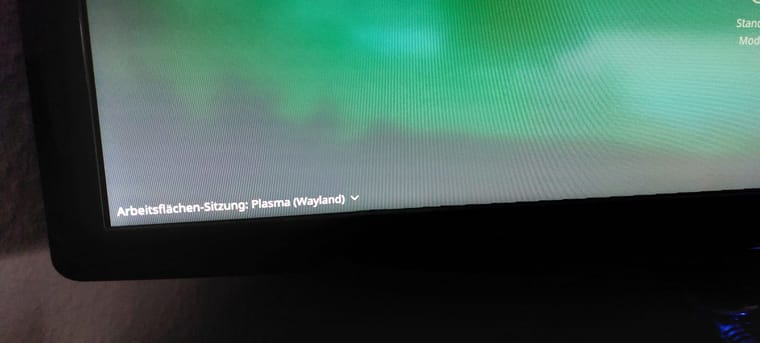
Man merkt dem KDE Plasma direkt an, das er wesentlich weniger Latenzen hat, als das olle X11. Ich musste dann dem Dan wieder auf die Nerven gehen, weil ich doch von dem Thema Grafik, 3D-Beschleunigung usw. NULL Ahnung habe. Er meinte dann zu mir, das Panfrost mittlerweile aktiv ist. Panfrost?
Schauen wir mal nach. https://docs.mesa3d.org/drivers/panfrost.html
The Panfrost driver stack includes an OpenGL ES implementation for Arm Mali GPUs based on the Midgard and Bifrost microarchitectures.
Im Quartz64 ist folgende GPU verbaut
- Mali-G52 2EE Bifrost GPU@800MHz
Diese wird von Panfrost unterstützt.
Jetzt stand da noch OpenGLS ES, was ist das?
OpenGL for Embedded Systems (OpenGL ES or GLES) is a subset[2] of the OpenGL computer graphics rendering application programming interface (API) for rendering 2D and 3D computer graphics such as those used by video games, typically hardware-accelerated using a graphics processing unit (GPU).
Quelle: https://en.wikipedia.org/wiki/OpenGL_ESIch habe dann mal geschaut, wie man Panfrost testen kann. Hier bin ich gelandet.
Ich habe zwei Test gemacht, einmal mit X11 und das andere Mal mit Wayland. Von dem X11 Test habe ich ein kleines Video angefertigt.
Am Ende könnt ihr den glmark Score erkennen 112
Und hier mal das Ergebnis mit Wayland 365 Ich würde jetzt als Noob sagen, Wayland ist 3,3 mal schneller. Da ich aber eingangs schon erwähnte, das ich von dem Thema keine Ahnung habe, überlasse ich den Menschen mit Fachkenntnissen die Einschätzung.

Mein subjektiver Eindruck ist, Wayland läuft wesentlich besser. Das habe ich auch auf meinem Haupt-PC schon festgestellt. Vor allen Dingen die Latenz ist um ein vielfaches besser. Aber wir dürfen auch nicht verschweigen, bei Wayland geht vieles noch immer nicht. Zum Beispiel konnte ich das Video nur auf X11 mit SimpleScreenRecorder machen.
Leider sind wir immer noch nicht an dem Punkt, wo z.B. Youtube Videos im FF einwandfrei laufen. Von der HArdware Unterstützung brauchen wir auch nicht zu sprechen, da geht immer noch nicht so richtig viel. Die PCIe Schnittstelle habe ich noch kurz mit einer NVMe getestet.
[frank@frank-pc e5f97e94-0e45-4fa6-b8fb-373e35c708f8]$ iozone -e -I -a -s 100M -r 4k -r 16k -r 512k -r 1024k -r 16384k -i 0 -i 1 -i 2 Iozone: Performance Test of File I/O Version $Revision: 3.489 $ Compiled for 64 bit mode. Build: linux Contributors:William Norcott, Don Capps, Isom Crawford, Kirby Collins Al Slater, Scott Rhine, Mike Wisner, Ken Goss Steve Landherr, Brad Smith, Mark Kelly, Dr. Alain CYR, Randy Dunlap, Mark Montague, Dan Million, Gavin Brebner, Jean-Marc Zucconi, Jeff Blomberg, Benny Halevy, Dave Boone, Erik Habbinga, Kris Strecker, Walter Wong, Joshua Root, Fabrice Bacchella, Zhenghua Xue, Qin Li, Darren Sawyer, Vangel Bojaxhi, Ben England, Vikentsi Lapa, Alexey Skidanov, Sudhir Kumar. Run began: Thu Apr 21 21:49:06 2022 Include fsync in write timing O_DIRECT feature enabled Auto Mode File size set to 102400 kB Record Size 4 kB Record Size 16 kB Record Size 512 kB Record Size 1024 kB Record Size 16384 kB Command line used: iozone -e -I -a -s 100M -r 4k -r 16k -r 512k -r 1024k -r 16384k -i 0 -i 1 -i 2 Output is in kBytes/sec Time Resolution = 0.000001 seconds. Processor cache size set to 1024 kBytes. Processor cache line size set to 32 bytes. File stride size set to 17 * record size. random random bkwd record stride kB reclen write rewrite read reread read write read rewrite read fwrite frewrite fread freread 102400 4 53221 74745 76900 77656 46983 73982 102400 16 135113 181063 182235 183108 131535 180494 102400 512 354092 361813 357888 362080 351316 361385 102400 1024 368909 373104 374076 378286 372179 372881 102400 16384 384251 378963 376150 377334 376874 377929 iozone test complete. -
 F FrankM hat am auf dieses Thema verwiesen
F FrankM hat am auf dieses Thema verwiesen
-
-
-
-
-
Quartz64 - Images
Angeheftet Verschoben Archiv -
-
-
